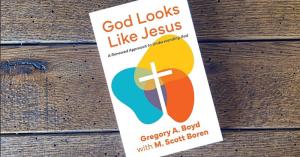Here I continue my discussion of Greg Boyd’s latest book God Who Looks Like Jesus: A Renewed Approach to Understanding God with Chapter 4: Literary Crucifixes. If you have read the chapter, feel free to comment. If not, fee free to ask a question.
Here Greg is laying out in one chapter the argument of his two volume work entitled The Crucifixion of the Warrior God. With regard to the Old Testament texts of terror he says “Since God works by means of influence rather than coercion, and since God had entered into a solemn covenant with his chosen people, God accommodated the fallen and culturally conditioned mindset of Moses, and of the Israelites. God meets people where they are, and this is where the Israelites were. This accommodation, however, meant that within the biblical narrative, God would take on the ugly appearance of a typical Near Eastern warrior deity who commands and assists his people in mercilessly wiping out various populations.” (82)
He argues that it was only Moses who thought he heard God command genocide; Joshua used Moses’s words to command the Israelites to do the same. He called on Moses’s authority. Only Moses misheard God, or put words in God’s mouth.
Why did God allow it? We know he didn’t really want it because Jesus is God and God is like Jesus and Jesus did not countenance killing innocent people. According to Greg, God took on the appearance of a violent warrior king by allowing Moses to so portray him as an example of divine accommodation but more. The “more” Greg means is that, for him, these Old Testament portraits of God are “historic testimonies to the truth” of what God would do in the cross of Jesus—bear the sins of people. God bore the sin of Israel, of Moses and Joshua, be letting them portray him as a God who commands genocide.
There’s much more in this chapter. Greg begins by appealing to Origen who denied the literal meaning of the texts of terror. And he gives reasons why Paul Copan’s and others’ interpretations of the texts as hyperbole don’t work. I can’t repeat everything in the chapter.
One response to Greg’s argument is that he might as well just go ahead and say that the Bible, at least parts of the OT, are not infallible. He is hesitant to do that, fearing that people will simply discard them. He adamantly insists that we must not do that. Wishing to honor all of scripture, he takes an approach similar to Origen’s and says the surface meaning is not the deeper meaning. The deeper meaning, however, is the cross—God’s sin-bearing in humiliation.
My own approach is simply to say that the Israelites blamed God (and Moses) for what they did. Something like that appears in their blaming God for their sin in the wilderness because God led them out of Egypt where they were allegedly better off.
In either or any case, it is very hard to take the OT texts of terror literally. When people do that, they tend, as Greg points out, to believe God sanctioned genocidal behavior after the Bible, in Germany (Ohlendorf), South Africa, and North America. If God commanded genocide once, it’s possible he has commanded genocide since and perhaps even now or in the future.
*If you choose to comment, make sure your comment is relatively brief (no more than 100 words), on topic, addressed to me, civil and respectful (not hostile or argumentative), and devoid of pictures or links.*












